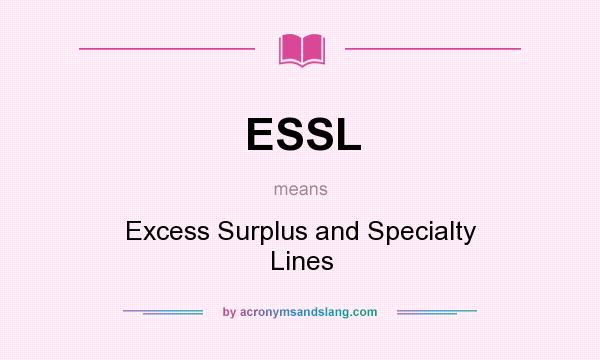What does ESSL mean?
ESSL means Excess Surplus and Specialty Lines
This acronym/slang usually belongs to Undefined category.
What is the abbreviation for Excess Surplus and Specialty Lines?
Excess Surplus and Specialty Lines can be abbreviated as ESSL

|
|
Most popular questions people look for before coming to this page
| Q: A: |
What does ESSL stand for? ESSL stands for "Excess Surplus and Specialty Lines". |
| Q: A: |
How to abbreviate "Excess Surplus and Specialty Lines"? "Excess Surplus and Specialty Lines" can be abbreviated as ESSL. |
| Q: A: |
What is the meaning of ESSL abbreviation? The meaning of ESSL abbreviation is "Excess Surplus and Specialty Lines". |
| Q: A: |
What is ESSL abbreviation? One of the definitions of ESSL is "Excess Surplus and Specialty Lines". |
| Q: A: |
What does ESSL mean? ESSL as abbreviation means "Excess Surplus and Specialty Lines". |
| Q: A: |
What is shorthand of Excess Surplus and Specialty Lines? The most common shorthand of "Excess Surplus and Specialty Lines" is ESSL. |
Abbreviations or Slang with similar meaning
- AISLIC - American International Specialty Lines Insurance Company
- EEMSP - Excess Emissions and Monitoring Systems Performance Report
- ESS&S - Excess, Surplus Sales, And Shipping
- OAPSLO - Ohio Association of Professional Specialty Lines Offices
- ACSPA - Australian Consumer and Specialty Products Association
- AEIL - American Export and Isbrendtsen Lines
- CIMS - Cryogenic Industrial Medical and Specialty
- ASL - Atlantic Specialty Lines
- ESSS - Excess Surplus Sales and Shipping
- ESLCA - Excess Surplus Lines Claims Association
- IESA - Indemnity Excess Surplus Agency
- KCCL - Kansas City and Corn Lines
- TRSL - Township Range and Section Lines
- ESL - Excess Surplus Lines
- ESP - Excess Surplus Property
- bmsr - Business Machine Surplus and Resale
- seal - Sealant Engineering and Associated Lines
- wsdm - Water Surplus and Drought Management
- aisl - American International Specialty Lines
- excess baggage. - Luggage that exceeds the allowed limits for weight, size, or number of pieces. Carriers usually charge extra for excess baggage and, in some cases, may have to ship it later rather than with the passe